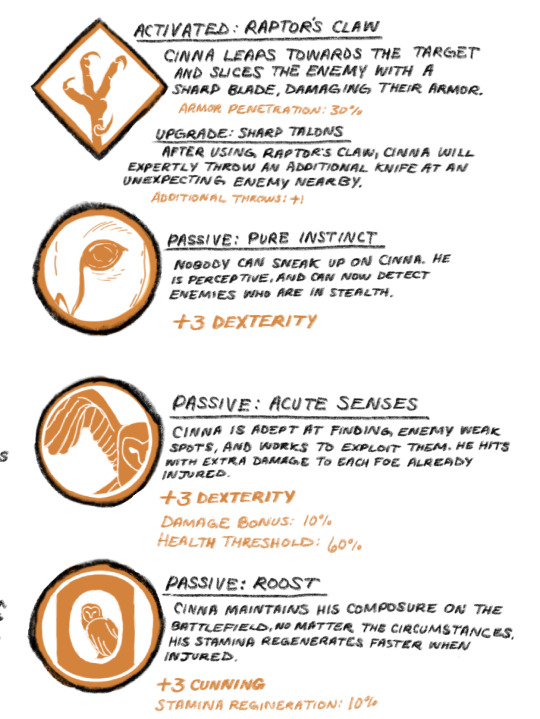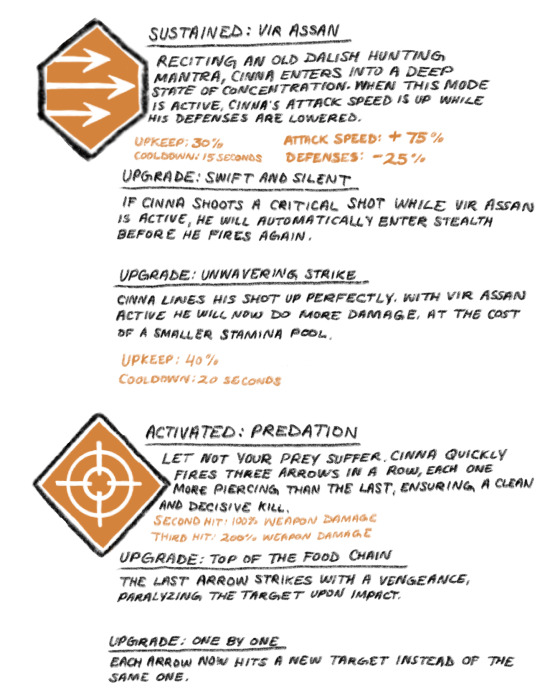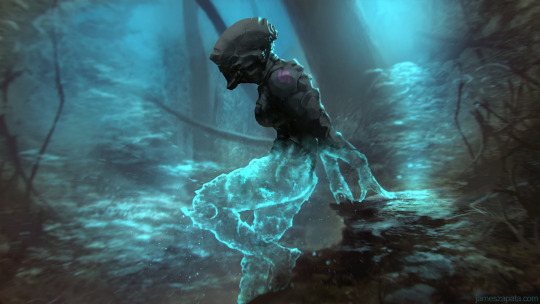#specialization
Text
It was a cottage of questioning witches, research witches. Eye of what newt? What species of ravined salt-sea shark? It's all very well a potion calling for Love-in-idleness, but which of the thirty-seven common plants called by that name in various parts of the continent was actually meant?
The reason that Granny Weatherwax was a better witch than Magrat was that she knew that in witchcraft it didn't matter a damn which one it was, or even if it was a piece of grass.
The reason Magrat was a better doctor than Granny was that she thought it did.
Terry Pratchett, Lords and Ladies
#granny weatherwax#esme weatherwax#magrat garlick#lords and ladies#discworld#terry pratchett#witches#Doctors#Magic#Medicine#Research#Questions#spell ingredients#Specialization#Eye of what newt#A better witch#A better doctor
2K notes
·
View notes
Text

I made a unique specialization tree for Cinna if he were a companion! I based it off of both the DA:2 and the DA:I trees even though he's just in Inquisition...each ability is explained below🦉



#i hope you can read my handwriting aaghhhh im recovering from ankle surgery so my writing gets a bit shit in some places LMAO#dragon age#dragon age inquisition#dragon age 2#dai#da2#bioware#skill tree#specialization#cinna#tallosart#i dont really know what to tag this as honestly!!!! i hope the masses on here like it as much as the people on twitter did#lavellan#Inquisitor as companion
302 notes
·
View notes
Text

#philosophy#quotes#Carlos Fuentes#Myself with Others#Fuentes#culture#connection#isolation#specialization
11 notes
·
View notes
Text

All new Hero Specializations from BlizzCon
8 notes
·
View notes
Text
Class Feature Friday: Ghost Specialization (Operative Specialization)

(art by James Zapata on Artstation)
Stealth is the best friend of any operative worth their price tag, but few are more skilled in stealth than those that are called “ghosts” by those they leave unaware of their presence until much, much later.
If a ghost does their job well, nobody will be the wiser to their presence during a job, whether they are a thief, an assassin, a spy, or some other form of especially stealthy operative. And if someone somehow catches wise to their presence, they are adept at taking down such witnesses and regaining control of the mission.
Now, obviously all ghost operatives are skilled at remaining unseen, but many also master the art of hiding in plain sight as well. After all, darkness, concealment, and a cloaking device are not always viable options. Heck, any and every tool that could help in their work is worth considering as long as it doesn’t slow them down
With that in mind, the ghost is perhaps one of the more straightforward types of operatives, but they are good at what they do.
Agility and stealth are what these operatives specialize in, and they find attacks from stealth to be all the easier.
Naturally, ghosts eventually get their own cloaking field. Which not true invisibility, they become extremely hard to spot while using it as light bends around them by magical or technological methods. However, without any upgrades it only lasts about a minute, forcing them to rely on traditional stealth most of the time.
More powerful agents can live up to their name and activate a phase shifter to pass through solid matter for a brief moment, which can be used for infiltration or escape, though doing so requires some resolve and can only be done once a day.
As a primarily stealth-based class, this option seems like the most “vanilla” option, but it’s a good one. Getting cloaking field early means you don’t have to set aside an exploit to get it if you want the superior upgraded version later on. No matter your build, you’ll probably want to line up a perfect first shot in combat and duck and weave out of a foe’s sensory range to keep them swiping at shadows. Outside of combat, I recommend focusing on buffing your skills up in a variety of categories so that you can back up your stealth with other ways to sneak in and out without anyone ever noticing, such as athletics, acrobatics, computers, and even engineering.
It might be easy to assume these operatives are loners that rarely interact with others, and while that may be true for some, consider that who they are while on the job may be very different than who they are off the job. That being said, they are very unlikely to crack jokes or be very talkative while working, as a breach of professionalism in this line of work can be deadly.
Grim as graveyard and cold as ice, the bleachling gnome Viccus is one of the greatest assassins you’ve never heard of, his skills as a silent assassin leaving behind nothing but bodies and rumors. However, one has to assume that he might have once had a happier life somewhere, far away.
Strangely untalented at magic for a hanakan, Ashuu managed to perfect one mystical trick, the art of concealing his presence, and so he put that to good use as an agent, slipping in and out of locations, particularly the holdings of corporations that have gotten a bit too eager to exploit what they consider a low-tech backwater world.
Hired as bodyguards for a high-profile diplomatic meeting, the party stumbles upon a shadowy figure attempting to break into the suite of the ambassador their client was meeting with. However, bringing him in must be done carefully to prevent an intergalactic incident.
8 notes
·
View notes
Text
RaR Musings #6: Specialists
I was playing Baldur's Gate 3, as a rogue. I dabble in rogues in DND, PF, and mmos, and they range from satisfyingly versatile to being boringly one-dimensional. DND's structure for sneak attacks is one of the few things I'm really impressed with though, because despite all characters being able to receive Advantage for attacking from stealth, flanking an outnumbered opponent, or hitting an incapacitated enemy, only rogues transform that mechanic into bonus Sneak Attack damage, and before it was patched out (for shame), the Arcane Trickster could inflict bonus sneak attack damage on spell attacks. In BG3, multiple magic items could grant advantage in different scenarios, which the rogue could use as a "magic wand of Backstab".
That kind of semi-detached crossclassing bait was a lot of what I wanted in Road and Ruin, and over the years, I developed a few abilities that either granted, or demanded, specialization to work, but it never really got to where I wanted it to be.
______________________________
'Specialists' in Road and Ruin are a necessity for a storytelling game; whether they're controlled by a player or brought in as NPC help, they represent broad spectrums of skill and knowledge that might be unreasonable for the player party to be assumed to have. The existence of specialists should lean storytelling in the direction of seeking them out, to get their insights, or pay for their services.
The simplest way to determine a specialist is specialization as a mechanic. As mentioned in Musings #5, specialization works as a x(2-5) multiplier for proficiencies when applied to a specific, niche topic. Specialization in horses might give Husbandry, Medicine, Binding, Command, or Ride multipliers, for example.
Secondarily, Disciplines act as specializations that are required. Crafts (Blacksmithing) or Research (Town History) are skills that require training; nobody is born knowing history, and nobody should be expected to accidentally replicate hundreds of years of advancements in crafting techniques. While an adventurer might pick up some basics in armor repair, they should in no way expect to be able to craft armor themselves without the associated discipline.
While specialization could extend to equipment, all it would be is simply being proficient in a device, I think, and preventing full control unless specialized, possibly incurring a breakage risk if someone isn't trained. Airplanes, for example, or other heavy machinery. An exception to this is combat:
______________________________
A fighter can specialize in both skill with a weapon, as well as fighting against particular weapon styles. I'd thought specialization might only apply in duelling, where both fighters roll a skill check and add their successes to the results of a d4/d8/d12 To Hit die, and that, turn by turn, the higher-skilled of the two would naturally gain an edge, but that ends up being too slow. Paired with the initiative changes from Musings #3, where fighters act each round simultaneously, and that health totals are so low in order to facilitate more lethal combat, and this blow-by-blow calculation ends up not feeling very good.
A simple solution would be to adopt DND's Advantage, and have specialization in a weapon allow you to roll one additional die per specialization level, and take the higher value. Since weapons only miss on a roll of a 1, and deal half damage or full damage otherwise, specialization effectively eliminates the risk of missing with a weapon. In the case of ranged weapons, like a bow or rifle, that use a kind of exploding-dice system of d4s, specialization would simply allow rerolls of a non-4 result, greatly increasing their accuracy, and thus, damage.
Specialization at fighting against a style could mean Taking the Edge, also mentioned in Musings #3. If you know your opponent, you'd be able to anticipate their moves much better, adding to their Preemptive/Presumptive speed.
______________________________
Beyond this, tool specialization effectively manifests as spellswords.
Squad Tactics can declare a Specialist unit type, who generates Tactic Points for use by other unit tactics. This lets multiple actors set up strategies like dominos, and if applying a specialization sets up more dominos, it results in greater conclusion power/success rating.
Celestial Trajectories, Martial Weaponry, and Fortress Guard all have customizable weapons, that specializing in would be a plus, but not a mechanically unique application. Instead, 'favoring' a specific weapon, not specializing in a weapon type, determines your attunement to the customizable weapon.
Mutations grant you specialization sometimes, such as darkvision, or telescopic vision granting advantages for Perception checks. Shapeshifters are able to grant themselves a variety of senses, and animal companions give you a second chance to detect things, if they're trained for that and have the senses, whereas sense-sharing would allow you to temporarily don a sense as a mutation.
Concealed Weaponry gives bonus damage and special effect application for rolling maximum on an attack roll against an unaware or distracted target, which would be made easier with stealth, but also with specialization in the weapon. It can also disguise said weapon, and has a special attack for a flurry with your specialized weapon.
Nimble Fingers' Maestro's Direction and Floral Flourish's Bud-bloom Brownies let you give commands to others, like conjured spirits, to do actions that you specialize in.
Cloaked in Shadow and Floral Flourish has material micromanagement, using mats like shadows and plants to grant specialization in a skill check.
So, after all this, I feel like I DO have some decent options for specialists, but as always, it depends what the specialist aims to achieve. Simply specializing in something doesn't have any kind of diverse spectrum of outcomes, so it'd have to be designed on an individual basis, but what I've got already is probably a good start.
2 notes
·
View notes
Text

Wonderful Things That May or May Not Be Wonderful
The Anteater. An odd animal. An animal whose entire existence is devoted to one thing: The consumption of ants and termites. Its body has evolved for this very purpose. Its long sticky tongue can find its way through tiny ant burrows to slurp out its prey. Its front claws have enough sharpness and strength to rip open termite mounds said to be as hard as concrete. Their long and dense fur protects from their prey's overwhelming assaults. Also, while the giant anteater is the most iconic, there are three other varieties, each having a prehensile table to help climb the trees of the jungle in search of their prize. That kind of sole specialization can be seen as depressing but it can also be seen taking every measure you can to achieve your goals. If you don't get what I'm saying here, it's that anteaters are wonderful and we should all love them!
#wonderful#anteater#ants#termites#animals#tongues#giant anteater#tamandua#aardvark#specialization#furry#tails#savanah
16 notes
·
View notes
Photo

She now gets 1000 DEF for 8sec. She’s the first of my 4* to reach M6.
8 notes
·
View notes
Text
That was the problem with witchcraft: It was as if everybody needed the witches but hated the fact that they did, and somehow the hatred of the fact could become the hatred of the person. People then started thinking: Who are you to have these skills? Who are you to know these things? Who are you to think you're better than us? But Tiffany didn't think she was better than them. She was better than them at witchcraft, that was true; but she couldn't knit a sock, she didn't know how to shoe a horse, and while she was pretty good at making cheese, she had to have three tries to bake a loaf that you could actually bite into with your teeth. Everybody was good at something. The only wicked thing was not finding out what it was in time.
Terry Pratchett, I Shall Wear Midnight
#tiffany aching#i shall wear midnight#discworld#terry pratchett#witches#witchcraft#facts#people#psychology#small towns#education#specialization#prejudice#necessity#power#fear#expertise#dependency#community#superiority#the only wicked thing#everybody is good at something
523 notes
·
View notes
Text
Unlike most other nuclear physicists, who had returned to their specialized pursuits after the failure of their attempts to help to mould the ideas of their countrymen, Oppenheimer continued his efforts in that direction.
"Brighter than a Thousand Suns: A Personal History of the Atomic Scientists" - Robert Jungk, translated by James Cleugh
#book quote#brighter than a thousand suns#robert jungk#james cleugh#nonfiction#nuclear physics#specialization#j robert oppenheimer
2 notes
·
View notes
Note
Hi I asked this a day or two before but I'm not sure if you got it so I'm just asking again incase. First off I just want to say I loved your demo and thought that the characters were thoroughly well written. Anyway I had a question about mages in general. Can mages have more than one specialization? Like can they have Battle-Mage and Conjurer? Or even more than two?
Hi there, thanks so much for your kind words! Just for future reference, I receive and answer so many asks that my queue is usually about two weeks long, so just a heads up that you might not see answers to your questions right away--if I can even get to them! :) Anyway, the topic of having multiple specializations has been discussed here, here, here, and here! Lore-wise, it is technically possible for a Mage to have two or more specializations: I liken it most closely to having two majors or two simultaneous degrees in college (or, more typically, having one major and one minor). However, while a Mage could academically become certified in two "majors" or more (already difficult enough), the odds of them being as equally as passionate, powerful, and skilled at both is exceedingly rare, and diminishes the more specializations you add. It's also more likely if the two specializations are related closely to each other. For example, it's more likely to have a Mage who's skilled at both Enchantment and Wild Magic (both psionic types of magic) than it is to have a Mage who's equally skilled at Divination (psionic) and Battle Magic (astral). It's like how you'll see more people with related majors (like English Literature and Philosophy, or Political Science and Law) than you might with completely opposite or unrelated degrees (like Veterinary Science and Aerospace Engineering). Hopefully that makes sense!
Within the game itself, it's not possible to have more than one true specialization, though it is possible to train in different types of magic other than the one you specialize in!
28 notes
·
View notes
Text

"it seems plain and self-evident, yet it needs to be said: the isolated knowledge obtained by a group of specialists in a narrow field has in itself no value whatsoever, but only in its synthesis with all the rest of knowledge and only inasmuch as it really contributes in this synthesis toward answering the demand, Tívεç dè nuεîç; 'Who are we?'"
— Iain McGilchrist, quoting Erwin Schrödinger.
4 notes
·
View notes
Text

My partner calls these monoliths although they are neither made of stone nor one piece.
These are the ones I haven't given away.
I'm about to branch out to 8 sided monoliths, and create a formula for how to calculate dimensions for a variety of iterations.
That's why they call me Amalia polymath. It's like Renaissance person, but even more so.
We should bring the term back. Specialization is boring. Be a generalist
5 notes
·
View notes
Link
6 notes
·
View notes
Video
youtube
Marilyn Monroe & Frankie Vaughan, Specialization, Let's Make Love, 1960
#Marilyn Monroe#Frankie Vaughan#Specialization#oldies#jazz#duo#60's#1960#Let's Make Love#yves montand#movie#ost#soundtrack
9 notes
·
View notes
Text
Pursuing an MBA can be a major investment in your future, so it's important to choose the right program for you. 👈🏻
Check out these top universities and popular specialization to help you find the right program. Whether you're looking to climb the corporate ladder or start your own business, an MBA can open up a world of opportunities. 🙌🏻
To learn more and start your journey towards a rewarding career, check out our exclusive college expert guidance at cademy1.com ✅
#mba#usa#university #specialization#MBATopBschools#topUSuniversities#mbaspecialization#businessschool#mbajourney#USAMBA#topbusinessschools#businesseducation#mbaadmissions#highereducation#educationalcounselor#studyabroad#studyabroadinusa#applynow
2 notes
·
View notes